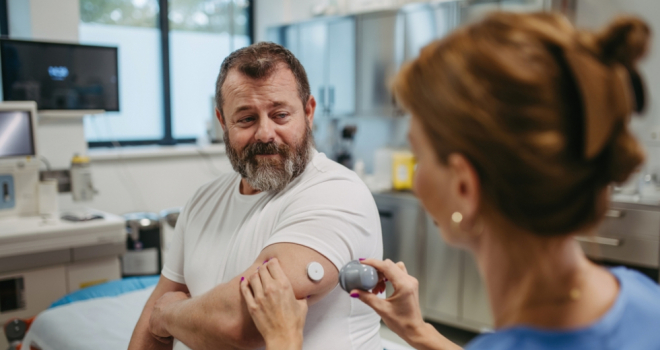
"It’s important that we familiarise ourselves with the symptoms and don’t put off seeking medical advice if we have any concerns."
- Dr Doug Wright, Medical Doctor at Aviva
Of those surveyed (1,000), 55% of men said they check their cholesterol, whilst over two-thirds (67%) check their blood pressure at least once a year. Notably, more than three in five (62%) check their heart rate and 77% check their weight.
Last year, prostate cancer made up 30% of Aviva’s individual Critical Illness (CI) cancer claims paid for men. Yet less than half (46%) of the men surveyed were either very or somewhat aware of the symptoms of prostate cancer. 25% said they knew a couple of symptoms and a concerning one in five (20%) said they didn’t know any of the symptoms.
Worryingly, those aged 45-54 years old were the least aware with 25% saying they weren’t aware of any prostate cancer symptoms. This is particularly concerning as age-specific incidence rates rise steeply from around 45-49 years old – peaking at 75 and above.
When asked to select symptoms that could relate to prostate cancer, 35% of men identified blood in urine, followed by needing to urinate more frequently (33%), a weak urine flow (29%), feeling that your bladder has not emptied fully (26%), difficulty in starting to urinate (26%), taking a long time to urinate (23%), and blood in semen (23%). Over one in five (22%) couldn’t identify any symptoms.
These findings align with research commissioned by the provider earlier this year into testicular cancer. Of those surveyed (2,002), over a quarter (28%) of men never check their testicles despite the heightened risk of testicular cancer among men aged 15-49 years old. While 28% said they check their testicles monthly, 12% said they didn’t think it was possible to detect warning signs of testicular cancer. This misconception rose to 20% for those aged 34-44 years old.
Although 57% of men knew what to look out for when checking their testicles, 37% didn’t know the symptoms of testicular cancer. Worryingly, 38% of those who weren’t aware of these crucial symptoms were 25-34 years old – according to Cancer Research UK, the peak rate of testicular cancer occurs between 30-34 years old.
When prompted, the majority of men (57%) recognised painless swelling or lumps in one of their testicles as a warning sign of testicular cancer, followed by changes in shape or texture (47%), dull ache or sharp pain in the testicles and/or scrotum that may come and go (42%), and a difference in appearance between one testicle and another (40%). Only 36% of men identified an increase in the firmness of a testicle as a potential warning sign while 33% said a feeling of heaviness in the scrotum could indicate testicular cancer.
Comparing these findings to previous research commissioned by Aviva looking into breast cancer, 82% of women said they know what to look for when checking their breasts, rising to 88% of women aged 50-71 years old. Just 18% said they don’t know what to look for when checking their breasts, increasing to 27% amongst those aged 25-34 years old and over a third (34%) of 18-24-year-olds. There’s a noticeable difference in the number of individuals knowing what to look for when checking their breasts (82%) versus testicles (57%).
Looking at other cancers, over a quarter of men (28%) said that they never check their skin for changes to the shape or size of moles. 21% said that they never check for other changes to their body – such as lumps or signs of change to their testicles. Of those who do check for signs of change to their body, fewer than half of men (45%) check themselves at least once a month.
Furthermore, Aviva found that while over half (56%) of men said that they seek medical advice as soon as they feel unwell, 30% said that they have put off seeking medical treatment in the past year. 39% wanted to wait to see if the issue would go away on its own first and around three in ten (29%) didn’t want to make a fuss.
“It’s concerning that there seems to be a lack of awareness of the symptoms of prostate cancer, with fewer than half of the men taking part in our survey saying that they have some awareness of the symptoms. This lack of awareness peaks at an age when men are most at risk of getting the condition,” stressed Dr Doug Wright, Medical Doctor at Aviva.
“If prostate cancer is caught early, the prognosis can be much improved – treatment can be given quicker, helping to reduce the risk of advanced cancer or metastasis – where the cancer spreads to other parts of the body. All these things can help improve survival rates,” he concluded.
